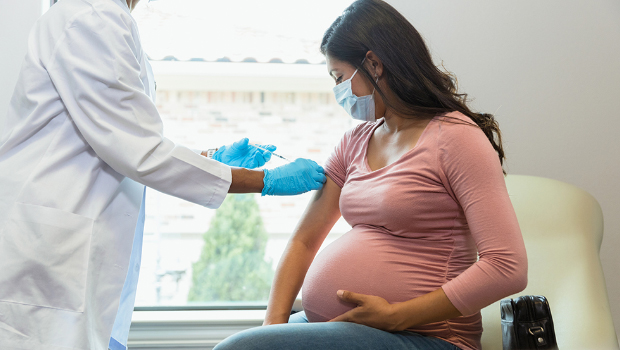COVID-19 vaccines safe for people who are pregnant

New data should increase confidence in vaccine safety among people who are pregnant and more at risk for COVID-19 complications
New research published in the New England Journal of Medicine found that COVID-19 vaccinations during pregnancy were not associated with increased risk of serious acute adverse events, such as blood clots, low platelets, or other serious conditions. The study supports a growing body of data that shows the vaccines are safe for people who are pregnant.
“If there are people who are hesitant to get vaccinated because they’re pregnant or thinking about getting pregnant, this data will hopefully reassure them that the COVID-19 vaccines are safe,” said Malini DeSilva, MD, researcher with HealthPartners Institute and lead author on the study. “It’s important that pregnant people are protected against the virus, because they’re at higher risk of serious complications.”
“Given the increased risk of severe illness with COVID-19 for pregnant people, it’s very reassuring to see more data like this that show a lack of serious side effects from receiving of COVID-19 vaccine during pregnancy,” said co-author Jennifer Nelson, PhD, a senior investigator and biostatistics director at Kaiser Permanente Washington Health Research Institute.
The researchers analyzed data from more than 45,000 people who received COVID-19 vaccinations during pregnancy or in the 28 days preceding pregnancy. The vaccinations occurred between Dec. 15, 2020 and July 1, 2021 and included the 3 COVID-19 vaccines currently approved for use in the U.S. Most people in the study received 2 doses of an mRNA vaccine (Pfizer-BioNTech or Moderna).
The vaccinations were associated with minor reactions like malaise, fever, and other well-documented side effects. But they did not cause serious adverse events such as anaphylaxis or other cardiac, hematologic, inflammatory, neurologic, and rheumatologic reactions.
By comparison, other studies have shown that people who are pregnant and infected with COVID-19 have an increased risk of hospitalizations and death. Some data also suggest that the virus can lead to stillbirth.
This work was done in collaboration with 8 large health systems across the nation, including Kaiser Permanente Washington, HealthPartners, and 4 other Kaiser Permanente regions. These health systems make up the Vaccine Safety Datalink, which conducts post-market vaccine surveillance projects in partnership with the CDC (Centers for Disease Control and Prevention). This is a particularly important area of research because COVID-19 vaccines did not include pregnant people during clinical trials.
“There was some understandable hesitation among those who were pregnant when vaccines first came to market because we didn’t have much data for this group of people,” DeSilva said. “But with this study, and other studies that have looked at COVID-19 vaccinations and pregnancy, we can be more sure that they’re safe and provide important protection for parent and baby.”
This has been adapted from a news story on this study by HealthPartners Institute.
Vaccine safety

COVID-19 vaccines and serious reactions: 3 questions answered
Jen Nelson, PhD, talks about monitoring reactions to the mRNA vaccines.
Vaccine Safety

Biostatisticians track COVID-19 vaccine safety
Dr. Jennifer Nelson explains how KP scientists are helping the CDC and FDA keep an eye out for rare adverse events.



